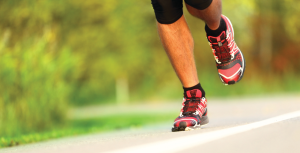Common Injuries in Runners: Achilles Tendinitis
By now, you know that bilateral deficits can lead to a wide range of chronic and acute injuries. Achilles tendinitis is  one such condition, and it accounts for 11 percent of all running injuries. The Achilles tendon is the fibrous connective tissue that joins the gastrocnemius and soleus muscles of the calf to the heel bone. When this large tendon experiences too much stress, it becomes inflamed, causing swelling and pain.
one such condition, and it accounts for 11 percent of all running injuries. The Achilles tendon is the fibrous connective tissue that joins the gastrocnemius and soleus muscles of the calf to the heel bone. When this large tendon experiences too much stress, it becomes inflamed, causing swelling and pain.
What Causes Achilles Tendinitis?
Achilles tendinitis is an overuse injury that occurs when the tendon is forced to work too hard. When the calf muscles are tight or fatigued, or when runners overpronate, the Achilles tendon takes on too much of the burden during a run. Inflammation of the tendon can also occur with shoes that do not offer adequate support or when you suddenly increase your level of activity without giving your body a chance to adjust. Symptoms of Achilles tendinitis include stiffness in the tendon upon awakening, pain in the heel or tendon that worsens with physical activity, swelling of the tendon, and bone spurs in the heel.
How Is Achilles Tendinitis Treated?
When a minor strain on the Achilles tendon is caught early, a few days of rest can usually reverse the condition. This includes taking ibuprofen for pain and swelling and icing the area for 20 minutes or so several times a day. While you should always discuss self-treatments with your trainer, you can typically return to running when you can perform toe raises without discomfort. Proper stretching and strengthening of the calf muscles, as well as addressing other biomechanical concerns, can help prevent a relapse.
More advanced cases may require physical therapy or special orthotic devices placed in your shoes. If you attempt to run through the pain rather than addressing the problem early on, you increase your chances of rupturing the tendon, which requires surgery to repair.
RPM2 footbed devices are invaluable in detecting issues with gait, pressure, and range of motion that can aid in improving your body’s mechanical functions. By using our products, you can adjust your training techniques to maximize your performance.
Comments (0)
Write a comment
Rating: Bad Good
Enter the code in the box below: